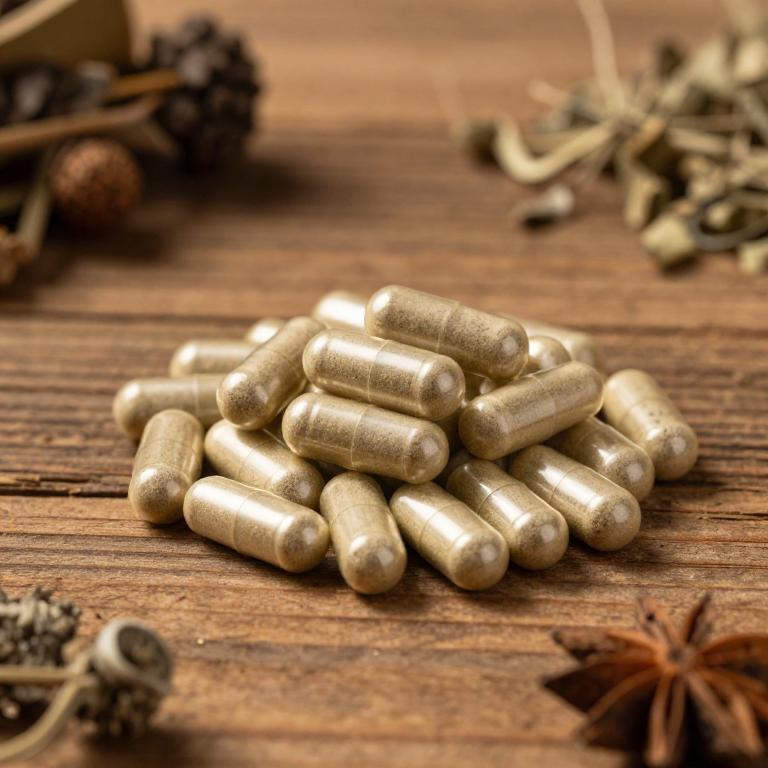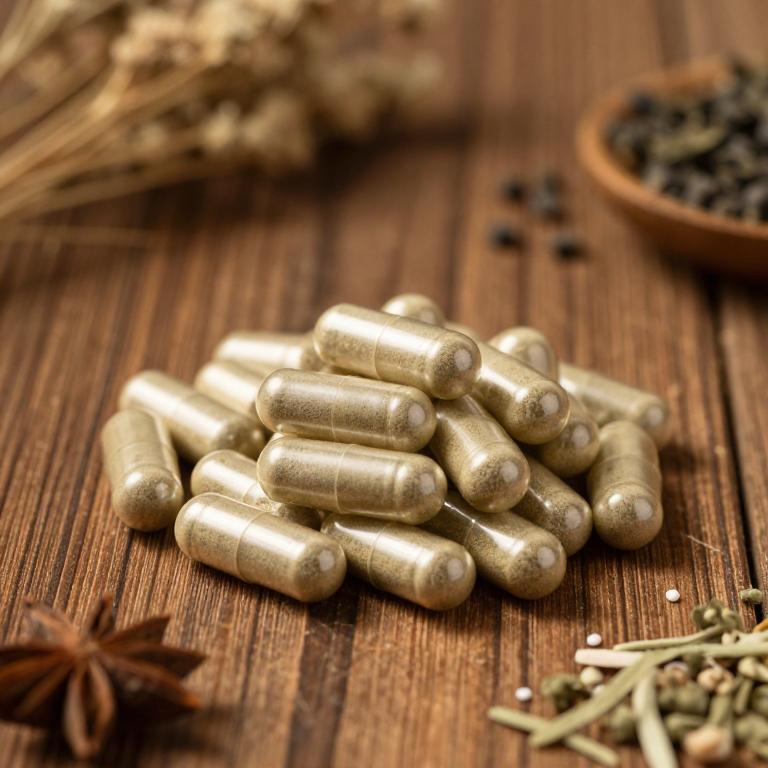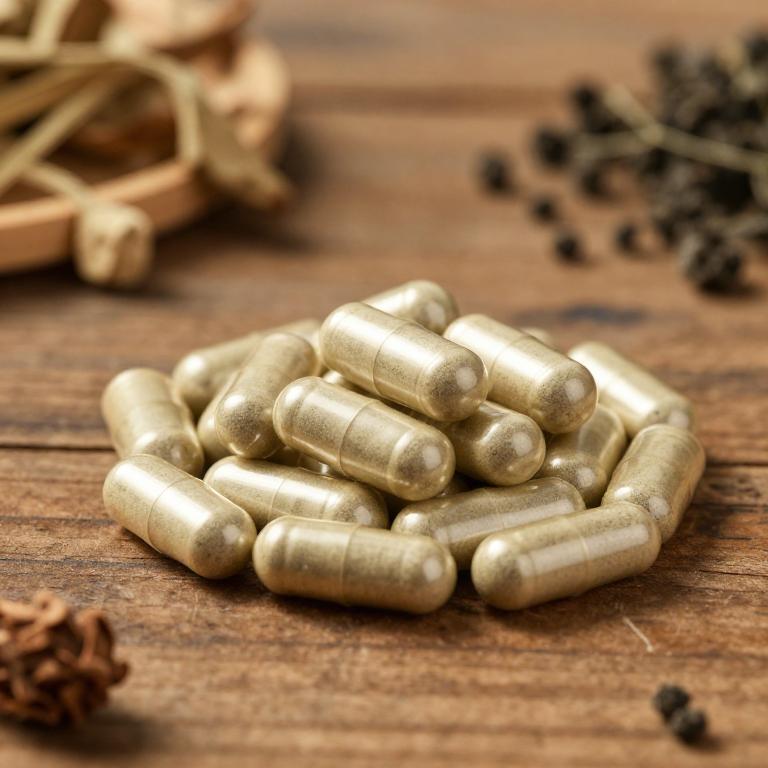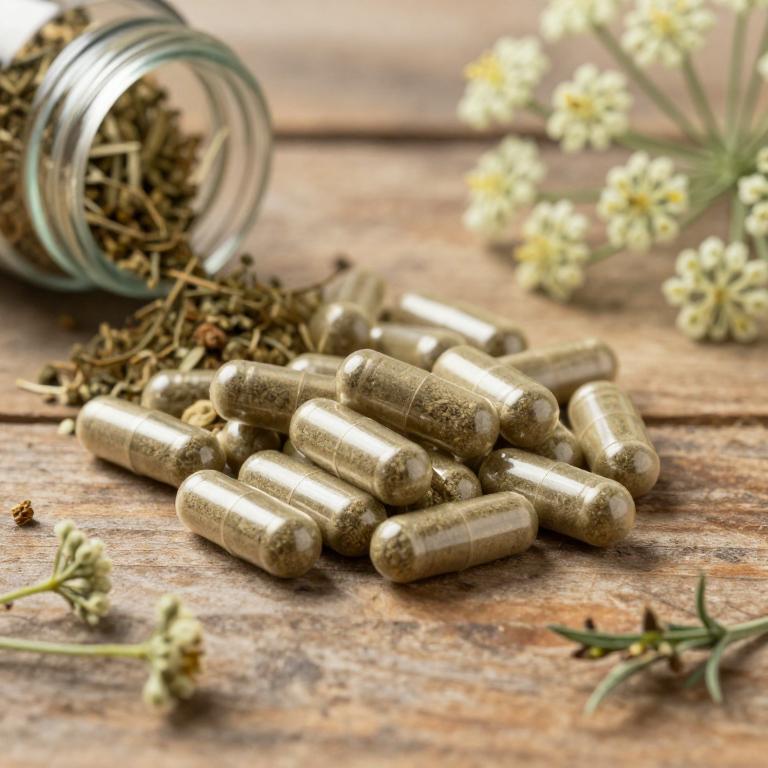10 Best Herbal Capsules For Uterine Fibroids

Herbal capsules for uterine fibroids are increasingly being explored as natural alternatives to conventional treatments, offering potential benefits with fewer side effects.
These supplements typically contain a blend of herbs such as green tea extract, chasteberry, and turmeric, which are believed to have anti-inflammatory and hormone-regulating properties. Some studies suggest that these herbs may help reduce fibroid size or alleviate symptoms like heavy menstrual bleeding and pelvic pain. However, more rigorous clinical research is needed to confirm their efficacy and safety.
It is important for individuals to consult with a healthcare provider before starting any herbal regimen, especially if they are on other medications or have underlying health conditions.
Table of Contents
- 1. Chaste tree (Vitex agnus-castus)
- 2. Black cohosh (Cimicifuga racemosa)
- 3. Thistle (Silybum marianum)
- 4. Stinging nettle (Urtica dioica)
- 5. Turmeric (Curcuma longa)
- 6. Licorice (Glycyrrhiza glabra)
- 7. Blessed thistle (Cnicus benedictus)
- 8. European plum (Prunus domestica)
- 9. Kudzu (Pueraria lobata)
- 10. Fennel (Foeniculum vulgare)
1. Chaste tree (Vitex agnus-castus)

Vitex agnus-castus, commonly known as chaste tree, is often used in herbal medicine to support hormonal balance and may be considered as a complementary therapy for women with uterine fibroids.
Herbal capsules containing vitex are believed to influence the pituitary gland, potentially regulating prolactin and estrogen levels, which are thought to play a role in fibroid growth. While some studies suggest that vitex may help reduce fibroid-related symptoms such as heavy menstrual bleeding, more research is needed to confirm its efficacy and safety for this specific condition. It is typically recommended as part of a holistic approach, alongside lifestyle changes and other medical treatments, under the guidance of a healthcare professional.
As with any herbal supplement, it is important to consult a physician before use, especially for individuals with existing health conditions or those taking other medications.
2. Black cohosh (Cimicifuga racemosa)

Cimicifuga racemosa, commonly known as black cohosh, is a herbal remedy that has been traditionally used to support hormonal balance and alleviate symptoms associated with menopause.
While it is not a cure for uterine fibroids, some studies suggest that it may help reduce fibroid-related symptoms such as heavy menstrual bleeding and pelvic pain. Herbal capsules containing Cimicifuga racemosa are often used as a complementary therapy alongside conventional treatments. However, it is important to consult a healthcare provider before using this herb, especially for individuals with hormone-sensitive conditions or those taking other medications.
The safety and efficacy of Cimicifuga racemosa for uterine fibroids should be evaluated on a case-by-case basis.
3. Thistle (Silybum marianum)

Silybum marianum, also known as milk thistle, is a herbal supplement that has been studied for its potential benefits in managing uterine fibroids.
The active compound in silybum marianum, silymarin, is believed to have antioxidant and anti-inflammatory properties that may help reduce the size of fibroids and alleviate associated symptoms. While some preliminary research suggests it may support hormonal balance and liver function, which are important in fibroid management, more clinical studies are needed to confirm its efficacy. It is often used as a complementary therapy alongside conventional treatments, but it should not replace medical advice or prescribed medications.
As with any herbal supplement, it is important to consult a healthcare provider before use, especially for individuals with existing health conditions or those taking other medications.
4. Stinging nettle (Urtica dioica)

Urtica dioica, commonly known as stinging nettle, is a plant that has been traditionally used in herbal medicine for its potential health benefits.
Urtica dioica herbal capsules are often marketed for their ability to support hormonal balance and reduce symptoms associated with uterine fibroids. These capsules are believed to contain compounds that may help in reducing the size of fibroids and alleviating related symptoms such as heavy menstrual bleeding and pelvic pain. However, it is important to note that while some studies suggest possible benefits, more rigorous clinical research is needed to confirm their efficacy and safety.
As with any herbal supplement, it is advisable to consult a healthcare professional before use, especially for individuals with existing medical conditions or those taking other medications.
5. Turmeric (Curcuma longa)

Curcuma longa, commonly known as turmeric, contains active compounds like curcumin that have been studied for their potential benefits in managing uterine fibroids.
These herbal capsules may help reduce inflammation and oxidative stress, which are often associated with fibroid growth. Some research suggests that curcumin could inhibit the proliferation of fibroid cells and promote their regression. However, while preliminary studies are promising, more clinical trials are needed to confirm its efficacy and safety for this specific condition.
As with any supplement, it is advisable to consult a healthcare provider before using curcuma longa capsules for uterine fibroids.
6. Licorice (Glycyrrhiza glabra)

Glycyrrhiza glabra, commonly known as licorice root, has been traditionally used in herbal medicine for its anti-inflammatory and hormonal balancing properties.
Some studies suggest that licorice root may help in reducing the size of uterine fibroids by modulating estrogen levels and inhibiting the growth of fibroid tissue. When used in the form of herbal capsules, glycyrrhiza glabra provides a convenient and standardized dosage for individuals seeking natural remedies. However, it is important to note that licorice root can have side effects, such as increased blood pressure, and should be used under the guidance of a healthcare professional.
While it may offer supportive benefits, it is not a substitute for conventional medical treatment for uterine fibroids.
7. Blessed thistle (Cnicus benedictus)

CNICUS BENEDICTUS herbal capsules are a natural supplement derived from the herb Cnicus benedictus, commonly known as blessed thistle, which has been traditionally used in herbal medicine for its potential health benefits.
These capsules are often marketed for their purported ability to support hormonal balance and may be used as a complementary therapy for conditions like uterine fibroids. While some studies suggest that Cnicus benedictus may have anti-inflammatory and antioxidant properties, there is limited scientific evidence specifically supporting its efficacy in treating uterine fibroids. As with any herbal remedy, it is important to consult with a healthcare professional before use, especially for individuals with existing medical conditions or those taking other medications.
Due to the lack of rigorous clinical trials, the safety and effectiveness of these capsules for uterine fibroids remain uncertain.
8. European plum (Prunus domestica)

Prunus domestica, commonly known as the European blackcurrant, has been explored for its potential health benefits, including its possible role in managing uterine fibroids.
Herbal capsules containing Prunus domestica extract are marketed as natural remedies that may help reduce the size of fibroids and alleviate associated symptoms such as heavy menstrual bleeding and pelvic pain. These capsules are believed to contain compounds like anthocyanins and flavonoids, which possess anti-inflammatory and antioxidant properties. However, scientific evidence supporting their efficacy for uterine fibroids is limited, and more rigorous clinical studies are needed to confirm their benefits.
As with any herbal supplement, it is important to consult a healthcare provider before use, especially for individuals with existing medical conditions or those taking other medications.
9. Kudzu (Pueraria lobata)

Pueraria lobata, commonly known as kudzu, is a traditional Chinese herb that has been studied for its potential benefits in managing uterine fibroids.
The herbal capsules derived from Pueraria lobata contain compounds such as isoflavones, which may help regulate estrogen levels in the body. Estrogen is often linked to the growth of uterine fibroids, so these capsules may offer a natural alternative for symptom management. Some research suggests that Pueraria lobata can reduce fibroid size and alleviate associated symptoms like heavy menstrual bleeding.
However, it is important to consult with a healthcare provider before using these capsules, as they may interact with other medications or have side effects.
10. Fennel (Foeniculum vulgare)

Foeniculum vulgare, commonly known as fennel, has been traditionally used in herbal medicine for its potential health benefits, including its possible role in managing uterine fibroids.
Fennel seeds and extracts contain compounds such as anethole and estragole, which may have anti-inflammatory and antioxidant properties that could support uterine health. While some studies suggest that fennel may help regulate menstrual cycles and reduce fibroid-related symptoms, more clinical research is needed to confirm its efficacy for this specific use. Herbal capsules containing foeniculum vulgare are often marketed as natural alternatives or supplements for women seeking non-invasive options to manage fibroid-related issues.
However, it is important to consult a healthcare provider before using fennel supplements, especially for individuals with hormonal sensitivities or existing medical conditions.